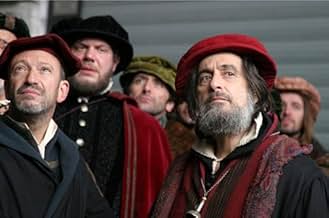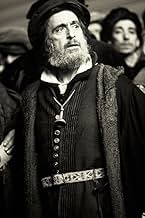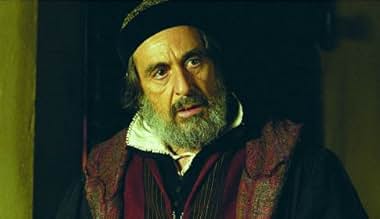Dans la Venise du XVIe siècle, lorsqu'un commerçant ne peut payer le prêt important d'un prêteur juif abusé à cause d'un ami aux ambitions romantiques, le créancier amèrement vengeur exige à... Tout lireDans la Venise du XVIe siècle, lorsqu'un commerçant ne peut payer le prêt important d'un prêteur juif abusé à cause d'un ami aux ambitions romantiques, le créancier amèrement vengeur exige à la place un paiement horrible.Dans la Venise du XVIe siècle, lorsqu'un commerçant ne peut payer le prêt important d'un prêteur juif abusé à cause d'un ami aux ambitions romantiques, le créancier amèrement vengeur exige à la place un paiement horrible.
- Réalisation
- Scénario
- Casting principal
- Nomination aux 1 BAFTA Award
- 2 victoires et 7 nominations au total
- Aragon
- (as Antonio Gil-Martinez)
Avis à la une
The movie does a great job of complicating the character of Shylock, and makes the viewer question his role as a victim or a villain. In the end, nobody will feel unmoved by the truly excellent and genuinely poignant court scene.
The courting prices are shallow stereotypes and constitute the only kind of (unintentional) humour this otherwise dry movie brings. I do not understand the choice of not giving the play-appropriated importance and weight in consequence to the casket-scenes. This is strange, since the movie is clearly a dramatized version of the play, and else there is not much that distinguishes Portia from a common harlot when every man can come make his suit without consequence. It saddens me to see the superficiality of these scenes, because Shakespeare did provide more complex and sympathetic characters in the original.
The situations and characters that result are extremely rich, and those are the things we notice and remember. They are rich because of the massive talent in how the small turns of phrase support the larger containing notions.
When the plays were performed in the form Shakespeare understood, there were essentially no sets or props and the actors' priorities were to convey the language. He knew nothing of the modern notion of acting where actors create characters, characters drive situations and situations define or illuminate a larger context. That's all backwards from his magical tradition.
So putting on a Shakespearian play today is a challenge of high order, at least doing it in such a way that the genius of the thing shines through. Otherwise, you have something of which we have hundreds of thousands of examples from lesser talents. It is made ever harder because actors believe Shakespeare was created for them, and actors together with other trades who appreciate their perspective control many creative decisions today.
Matters are much worse when conveying Shakespeare to film. The "language" is different bigger including a growing vocabulary of visual language. And the actors are even more unavoidable.
In "Merchant," Shakespeare's big notions had to do with deviation from law in as many forms as he could fit into the play. Foremost among these was the "law" of the dramatic form; this play famously mixes tragedy and comedy. In tragedy, the characters accidentally fall into the machinery of the universe and get ground up, often accelerated by what they "must" do. (In film that would be "noir.")
In Shakespeare's comedies, the characters understand the rules and are able to play with them without hazard for their amusement. (A film equivalent would be screwball.) So one large notion of dealing with law is the very construction of the play: two different notions of law, one within and the other without. Lynch in "Blue Velvet" would similarly have two genres as conflicting characters.
Shakespeare of course piles dozens of other problems with laws, rules and norms into his story: the Venetian legal system, religious prescriptions, and on and on, even down to the duties of a daughter in carrying out her father's eccentric will.
The magic isn't in any of this, impressive as it is. The magic comes in how he constructs the language and metaphors that dart in and out of the various issues and perspectives. Sometimes a metaphor is captured by itself. Sometimes it stands outside itself. Sometimes it even mocks or annotates itself. Its as if he created molecules that have the same lives as the galaxies and then let all the stuff in the middle (people, cities, religions) just emerge but with rich commentary on the laws of emergence.
We do have very good film adaptations of Shakespeare. "Prospero's Books" is a terrifically deep understanding of the spoken and cinematic languages and the self-reference of explicitly portraying the playwright. Branaugh's "Hamlet" appropriately subordinated images and actors (both excellent in his case) to the narrative in the language. Godard's "Lear" is also good, completely translating and discarding the language. Luhrmann's "Romeo and Juliet" takes the kinds of risks with cinematic poetry and magic the source does with language.
Now this. Much has been made of the anti-Semitism, and some about the overt homosexuality. Both are social constructions much younger than this play. For London audiences, no people they knew could be more cartoonish than Italians: foppish, superficial and lacking introspection. This play is anchored on two characters: the aging gay merchant of the title and a rich, ripe orphan virgin. Both end up in differing intrigues over love for the same pretty boy. Both intrigues involve rules, law and money and the writer has them interact.
The Jew and his daughter are secondary, no more important than the contents of the boxes and portrayed no more ruthlessly than the Italians around him. His engagement is more a device to introduce religious law outside that known to the audience. We add the anti-Semitism here, something the adapter decided to accentuate.
This is a nice movie. Everything about it is pretty. Even the modern constructions of characters by Pacino and Irons have a prettiness to them, As an ordinary movie (like say, "Amadeus") it is a reasonable filler of time if your life is lacking in prettiness.
But the source has something far richer to feed us with, the ability to be in a story and think about that story: to break our narrative eye into dozens of fairies, some of which dance outside the engagement and some that are swept along. None of that conveys here. We are instead locked into a single narrative thread, despite many cinematic techniques from others that would have allowed otherwise.
Radford chooses the gold box. We have the sex, not the love. Our ships are lost.
Ted's Evaluation -- 2 of 3: Has some interesting elements.
The acting was simply superb. Al Pacino was (as ALWAYS) perfect. He captured the torture of emotions that run through Shylock impeccably and easily stole the spotlight whenever he was on screen. Jeremy Irons paved the way for great British acting in his earlier times, and now has done the same. Also Lynn Collins, a fairly recent newcomer was perfect as Portia. She was stunning to look at and managed to pull of the speeches with grace.
Although i have all this praise, the film was definitely over-long and many scenes seemed to me like they could have done with a few edits or too. However, the atmosphere of Venice was amazing and it truly felt real in all the mannerisms of the actors.
Ultimately a very successful and ambitious film, that leaves nothing to the imagination, as it is a very realistic approach to Shakespeare. Beautiful to look at and incredible actors too (especially for Pacino) make this a great film that i would watch again an recommend at the drop of a Venetian hat.
The text is quite stripped down with many passages cut. But, I only noticed one line which was cut at the moment when I expected to hear it - and it was replaced by a look that said it all. This economy and judicious editing has given us a gripping movie - not just a film of the play.
And at last, there is a rationale as to why Antonio is so loyal and generous to the undeserving/unrelated Bassanio - you can almost feel Antonio's pulse start to race when he catches glimpse of Bassanio passing by in a gondola, or arriving for a visit. But it is as subtle as that - no more. I was spellbound.
There were many other highlights. I felt the arguments during the trial to be heartbreaking. And, the suitors' trials are hilarious.
Add all that to glorious cinematography and costumes that resonated with the times, and you'll understand why I can't wait to see it again. And again.
The film deftly explores the themes of love vs loyalty, law vs justice, and passion vs reason. Some might protest that the content is inherently anti-semitic, however they should consider the historical context of the story, and the delicate and nuanced way in which it is told in this adaptation.
9/10
Le saviez-vous
- AnecdotesThe bare-breasted prostitutes were not put in the film to make it more risqué, but rather to add a note of historical authenticity. Venetian law at the time required all prostitutes to bare their breasts because the Christian authorities were concerned about rampant homosexuality in their city.
- GaffesIn Venice in 1598 a woman with no head-dress and her hair flowing loose would be taken for a whore, yet this is how Portia frequently appears.
- Citations
Shylock: I am a Jew! Hath not a Jew eyes? hath not a Jew hands, organs, dimensions, senses, affections, passions? Fed with the same food, hurt with the same weapons, subject to the same diseases, healed by the same means, warmed and cooled by the same winter and summer, as a Christian is? If you prick us, do we not bleed? if you tickle us, do we not laugh? if you poison us, do we not die? And if you wrong us, shall we not revenge? If we are like you in the rest, we will resemble you in that. If a Jew wrong a Christian, what is his humility? Revenge. If a Christian wrong a Jew, what should his sufferance be - by Christian example? Why, revenge. The villany you teach me, I will execute, and it shall go hard - but I will better the instruction.
- Crédits fousPROLOGUE: "Intolerance of the Jews was a fact of 16th century life even in Venice, the most powerful and liberal city state in Europe."
"By law the Jews were forced to live in the old walled foundry or 'Geto' area of the city. After sundown the gate was locked and guarded by Christians."
"In the daytime any man leaving the ghetto had to wear a red hat to mark him as a Jew."
"The Jews were forbidden to own property. Thus, they practiced usury, the practice of lending money at interest. This was against Christian law."
"The sophisticated Venetians would turn a blind eye to it but for the religious fanatics, who hated the Jews, it was another matter . . . "
- ConnexionsFeatured in 'Merchant of Venice': Shakespeare Through the Lens (2005)
- Bandes originalesWith Wand'ring Steps
Composed by Jocelyn Pook, Lyrics by John Milton
Arranged by Jocelyn Pook
Performed by Baroque Strings Quartet Ensemble, featuring solo vocals by Andreas Scholl
Harp: Siobhan Armstrong
Psaltery: Harvey Brough
Lute: Elizabeth Kenny
Published by Shylock Ltd / EMI Music Publishing Ltd
© 2004 Decca Music Group Limited
(p) Jocelyn Pook Ltd. /2004 Decca Music Group Limited
Meilleurs choix
Détails
- Date de sortie
- Pays d’origine
- Sites officiels
- Langues
- Aussi connu sous le nom de
- The Merchant of Venice
- Lieux de tournage
- Esch-sur-Alzette, Luxembourg(only Venice film set)
- Sociétés de production
- Voir plus de crédits d'entreprise sur IMDbPro
Box-office
- Budget
- 30 000 000 $US (estimé)
- Montant brut aux États-Unis et au Canada
- 3 765 585 $US
- Week-end de sortie aux États-Unis et au Canada
- 69 868 $US
- 2 janv. 2005
- Montant brut mondial
- 21 560 182 $US
- Durée
- 2h 11min(131 min)
- Couleur
- Mixage
- Rapport de forme
- 2.35 : 1










































